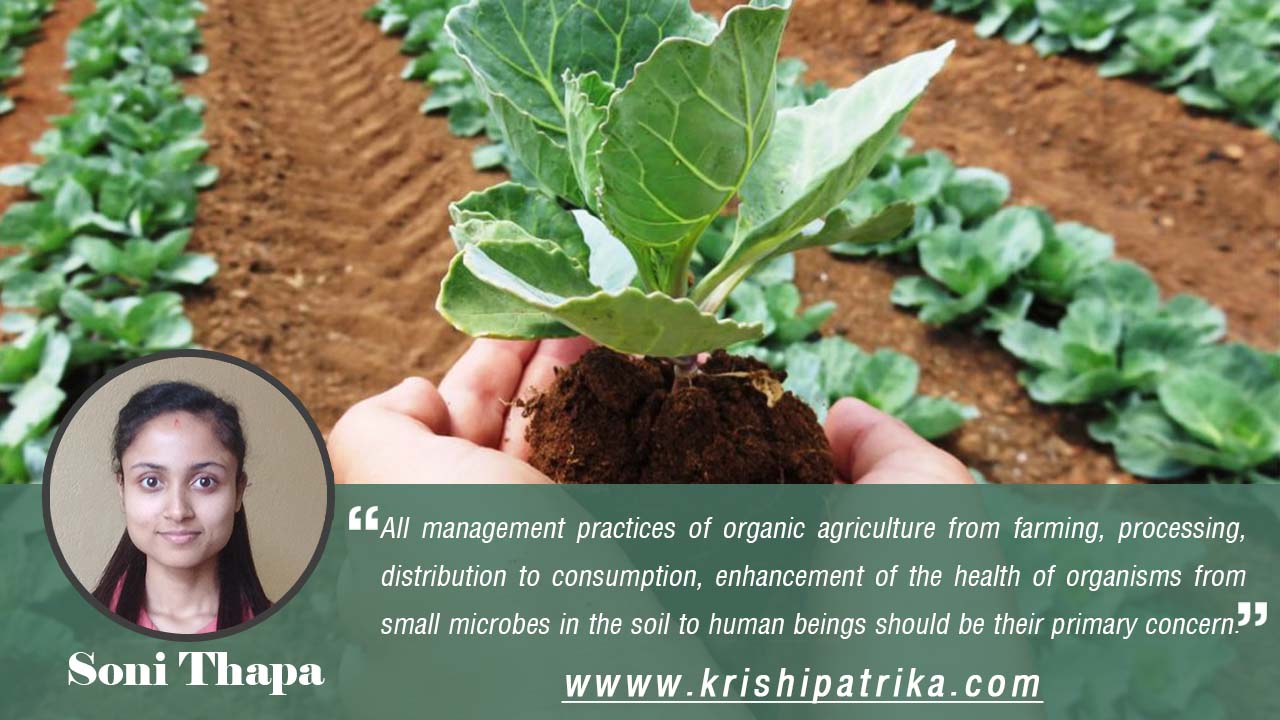
The present scenario of COVID-19 has made us realize the importance of the ecosystem and has urged us to consider the environment we live in as the prime factor in any farming practices. Thus, In this situation, organic agriculture is considered the best sustainable farming approach as it enhances the efficiency and productivity of land without jeopardizing the health and well-being of the ecosystem. Moreover, Organic Agriculture ensures fairness to all the components of the ecosystem since all the management practices of organic agriculture are based on the principle of health, principle of fairness, principle of ecology, and principle of care.
1.PRINCIPLE OF HEALTH :
The principle of Health highlights to sustain and enhance the health of all components of ecosystem like biotic components (flora, fauna, human beings, animals) and abiotic components (land, water, ecosystem, wetland) as they all are interconnected as one and is indivisible. In All management practices of organic agriculture from farming, processing, distribution to consumption, enhancement of the health of organisms from small microbes in the soil to human beings should be their primary concern. Organic agriculture is intended to produce highly nutritious food that contributes to preventive health care and the overall well-being of the whole system. So, organic agriculture should avoid the use of synthetic fertilizers, pesticides, animal drugs, and food additives to sustain the health of the whole ecosystem. To enhance the health of the ecosystem, it should adopt different management practices like Use of Green manure and organic fertilizers (FYM, Poultry manure, vermicompost ), No use of heavy machinery for field operations, Residual management, biofertilizers, Maintenance of Buffer zone of 4-5 m between organic and conventional farming and so on which enhance the health of soil, thus ultimately sustaining the health of the whole ecosystem.
2.PRINCIPLE OF ECOLOGY :
The principle of ecology states that Organic agriculture should be based on living ecological systems and cycles, work with them, emulate them and help sustain them through appropriate farming packages. For example, in the case of crops, the living ecosystem is soil. So, every management practice should be based on the conservation of all components of soil like microflora and fauna. Avoidance of chemical fertilizers and mechanization, use of organic manures are included in such practices conserving the biodiversity of flora and fauna. For animals, the living ecological system is the farm ecosystem, whereas, for fish and marine organisms, the aquatic environment. So, the farming operation should conserve and consider the living ecological systems through different management practices like the use of organic inputs, underutilized and neglected crops, climate-smart agriculture practices, diversified crops and animal enterprise, organic matter accumulation, nutrient cycling, proper design of farming system and so on. Thus, the principle of ecology emphasizes on reuse of inputs, recycling of farm waste, reduction in external inputs, and over-exploitation of resources as the ecosystem is the common home for all organisms.
3.PRINCIPLE OF FAIRNESS :
The principle of Fairness emphasizes the relationship that ensures fairness to all types of components of the ecosystem concerning the common environment and life opportunities. Fairness is characterized by equity, respect, justice, and equal benefits of the shared world, both among people and with other living beings. It should provide fairness to all stakeholders like farmers, workers, processors, distributors, and consumers. It should contribute to food sovereignty so that there will be provision of credit for food production to farmers along with traders. It aims to produce a sufficient supply of goods and other products. This principle insists that animals should be provided with the conditions and opportunities of life that accord with their physiology, natural behavior, and well -being. So, the overall emphasis of the principle of fairness is the proper utilization of natural and environmental resources that is socially and ecologically sustainable and ensure fairness for every component of the ecosystem and future generations.
4.PRINCIPLE OF CARE :
The principle of care states that organic agriculture should be managed in a precautionary and responsible manner to protect and foster the health and well-being of current and future generations and the environment. Precaution and responsibility are the key concerns in management, development, and technology choices in organic agriculture. So, we should be careful about approaches and techniques and should ensure that those approaches do not harm any components of the ecosystem. Organic agriculture is a living and dynamic system that responds to internal and external demands and conditions. Thus, organic agriculture should prevent significant risks by adopting appropriate technologies so that it contributes to a resilient ecosystem.
Summing up, the principle of organic agriculture ensures the well-being of all biotic and abiotic components of the ecosystem through appropriate management practices due to which it has emerged as a great hope towards the resilient ecosystem. It not only emphasizes on the efficiency and production of quality food but also consider the need of the current as well as future generations along with ensuring balanced ecology. Thus, Ecosystem being one of the prime concerns in the farming system, everyone should contribute from their level to enhance and sustain the ecosystem.









